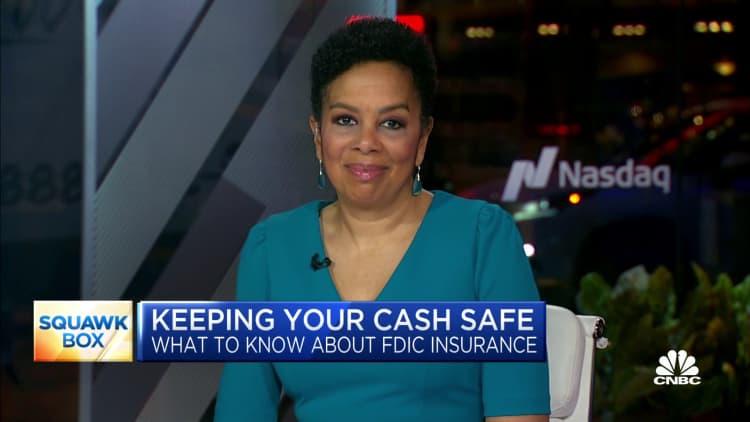People wait for service outside Silicon Valley Bank in Menlo Park, California.
John Brecher | The Washington Post | Getty Images
Account holders at failed Silicon Valley Bank and Signature Bank got a lucky break in recent days when emergency federal efforts ensured that billions in uninsured deposits were protected.
But the same may not be true the next time another bank fails, Treasury Secretary Janet Yellen said this week.
Depositors generally have up to $250,000 of coverage per bank, per account ownership category through the Federal Deposit Insurance Corporation, or FDIC.
More from Personal Finance:
Why our brains are hard-wired to go on ‘bank runs’
What bank failures mean for consumers and investors
What to know about FDIC insurance coverage
However, many of Silicon Valley Bank’s customers, which largely included venture capital firms, small technology companies and entrepreneurs, had uninsured deposits at the time it failed. S&P Global Market Intelligence data from 2022 showed 94% of SVB’s depositors were above the $250,000 FDIC limit.
Those depositors, as well as those in Signature Bank, got a reprieve, as bank regulators announced a plan to fully insure all deposits among other measures aimed at helping to prevent triggering a bigger financial emergency.
“The American people and American businesses can have confidence that their bank deposits will be there when they need them,” President Joe Biden said Monday.
Yellen said that in the future, however, uninsured deposits would only be covered in the event that a “failure to protect uninsured depositors would create systemic risk and significant economic and financial consequences.”

For many consumers, thd recent bank failures may bring back memories of the 2008 financial crisis.
While experts say this time is different, there’s no guarantee another failure will not happen. Certain other institutions have also showed signs of stress this week. First Republic received financial aid from other financial institutions to help curb its woes, while Credit Suisse also borrowed billions.
Experts say now is the time to make sure your deposits are protected.
How FDIC coverage works
The limit for FDIC coverage is $250,000 per depositor, per bank, in each account ownership category.
Since the independent government agency began providing coverage in 1934, no depositor has lost insured funds due to a bank failure. The FDIC is funded by premiums paid by banks and savings associations.
“The majority of Americans are going to be covered by FDIC insurance because most Americans have less than $250,000 in a specific bank account,” said Ted Jenkin, a certified financial planner and CEO and founder of oXYGen Financial, a financial advisory and wealth management firm based in Atlanta. He is a member of CNBC’s Financial Advisor Council.
The majority of Americans are going to be covered by FDIC insurance.
Ted Jenkin
CEO of oXYGen Financial
The amount of insurance is based on legal ownership name, according to Jude Boudreaux, a CFP and senior financial planner at The Planning Center in New Orleans who is also a member of CNBC’s Financial Advisor Council.
For example, a married couple with a business may have up to $250,000 insured in an account in one spouse’s name, up to $250,000 insured in an account in the other spouse’s name and up to $250,000 insured in a business account.
How to check, boost FDIC protection
If you want to know whether your deposits are FDIC-insured, check your bank statement, Jenkin said.
“If you’re going to a bank or you’re putting your cash anywhere, that’s the first question you want to ask, ‘The money I’m depositing now, is it FDIC-insured?'” Jenkin said.
You may also check the FDIC’s Electronic Deposit Insurance Estimator to see whether your funds are insured at your institution and whether any portion exceeds coverage limits.
Customers outside a Silicon Valley Bank branch in Beverly Hills, California, on March 13, 2023.
Lauren Justice | Bloomberg | Getty Images
One way to boost your FDIC coverage is to open accounts at other banks, particularly if you have more than $250,000 in deposits, Boudreaux said.
If you want additional coverage, you may also want to talk to your current bank, Boudreaux suggested. In some cases, they may work with other FDIC-insured institutions to have larger cash deposits protected and insured.
Small businesses may also want to explore the possibility of pursuing additional coverage through multiple banks.
Other financial safety nets may help
Treasury bills are also a strong option now, as short-term bills currently have a good yield and are backed by the full faith and credit of the U.S. government. “They’re as good as it gets from a safety standpoint,” Boudreaux said.
Not all accounts provide FDIC coverage, Jenkin noted. For example, a brokerage account opened with a financial advisor will likely be covered by the Securities Investor Protection Corporation, or SIPC.
Under FDIC coverage, you will be refunded dollar for dollar if your bank fails, plus any interest earned up to the date of the default.
Under SIPC, if something happens to your brokerage firm, you are covered for up to $500,000, with a $250,000 limit for cash.
However, protection under SIPC is limited and notably does not provide protection if your securities decline in value.










